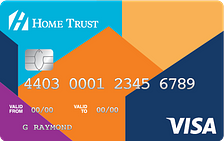Best Home Trust Visa Cards in Canada for 2026
Home Trust issues 3 cards, but the best is the Home Trust Preferred Visa. Before we get into the details, we should point out that all of their available credit cards don't have much in the way of benefits.
Instead, Home Trust Visa cards are known for low foreign exchange fees and building your credit score. Since 2 of the cards are secured, they're great options for someone who's struggling to get credit card approval. We'll compare the features of each Home Trust card and recommend alternative options.
Key Takeaways
- The Home Trust Preferred Visa is a no fee unsecured credit card that earns you rewards on your purchases.
- Home Trust issues a no fee secured credit card, but if you pay a small annual fee, you'll get cheaper interest rates.
- The Home Trust Preferred Visa does not charge foreign transaction fees, saving you 2.5% on foreign purchases.
Home Trust bank credit cards
| Category | Credit card | Rewards | Annual fee | Foreign exchange fee | Best alternative credit card |
|---|---|---|---|---|---|
| Best overall | Home Trust Preferred Visa | * 1% cash back on all purchases | $0 | 0% | |
| Best secured | Home Trust Secured Visa Card | * None | $0 | 2% | |
| Best low interest | Home Trust Secured Visa (Low Rate) | * None | $59 | 2% |
Best overall: Home Trust Preferred Visa
Pros:
- 1% cash back on all purchases
- No foreign exchange fees
- No annual fee
Cons:
- No rewards on foreign currency purchases
- Limited insurance included
The Home Trust Preferred Visa offers an elusive combination of both no annual and foreign exchange fees. While most credit cards charge a fairly substantial 2.5% foreign exchange fee, this card waives it altogether. So whether it's for a trip abroad or frequent cross-border shopping trips, you'll keep some extra cash in your bank account.
On top of that, you'll also earn 1% cash back on all purchases – except on foreign currency purchases – and get basic purchase protection.
You might also consider: Rogers Red World Elite Mastercard
The Rogers Red World Elite Mastercard is our top pick for the best no fee cash back credit card. It's also the best credit card to use when shopping at Costco. It's no slouch abroad, either – not only will you earn 3% back on USD purchases, you'll also get 2% back on non-USD purchases if you have a Rogers, Fido, or Shaw service.
Best secured: Home Trust Secured Visa
Pros:
- Secured credit card issued by a bank
- Nearly guaranteed approval
- No annual fee
Cons:
- $500 minimum security deposit required
- No rewards on purchases
If you have poor or no credit, a secured credit card can be a good option, and Home Trust offers the Home Trust Secured Visa Card. Simply apply online, submit your security deposit, and Home Trust will send you a credit card you can use like a regular card. The main appeal of a secured credit card is that it can help you start to build or improve your credit score.
Your card's credit limit is equal to your security deposit, which ranges from $500 to $10,000. Your deposit is returned to you when you close your account – assuming you've made all of your payments.
This card has no annual fee and no rewards, but it does offer a slightly lower foreign exchange fee of 2%.
You might also consider: Neo Secured World Elite Mastercard
The Neo Secured World Elite Mastercard is the best secured credit card in Canada. While it does have an annual fee, it offers up to 5% cash back with Neo partners and 12 types of insurance, which more than make up for the fee.
Best low interest: Home Trust Secured Visa (Low Rate)
Pros:
- Secured credit card issued by a bank
- Near-guaranteed approval
- Lower purchase interest rate of 14.9%
Cons:
- $500 minimum security deposit required
- No rewards on purchases
- Annual fee of $59
The Home Trust Secured Visa (Low Rate) is similar to the secured Visa but offers a lower interest rate of 14.9% (compared to 19.99% for the regular version). If you tend to carry a balance on your credit card, this will help you save on interest charges – and hopefully pay your balance back sooner.
You might also consider: Rogers Red World Elite Mastercard*
Instead of getting a secured credit card, consider the Rogers Red World Elite Mastercard. There's no annual fee and your balance actually earns interest – up to 2.25% (which is better than many savings accounts). If you plan to make purchases abroad, you won't be charged foreign exchange fees. And, since it's a prepaid card, there are no interest rates to worry about.
What is Home Trust?
Home Trust is a Canadian financial institution known for its mortgage lending services. Established in 1977, it's now part of the Fairstone Bank family of brands, alongside other excellent names in personal finance, like Oaken Financial and Fig.
In recent decades, Home Trust has experienced significant growth and now offers a range of financial services, including mortgages, reverse mortgages, credit cards, and investment services, to help customers achieve their retirement and savings goals.
Pros and cons of Home Trust credit cards
Like most credit cards, there are benefits and drawbacks to these offerings. You'll want to consider both before applying for a Home Trust credit card.
Home Trust has a couple of key benefits:
- No annual fee on most cards. Unless you're looking for a lower interest rate, you won't have to worry about paying an annual fee with Home Trust's credit cards.
- Low foreign exchange fees. All Home Trust credit cards have foreign exchange fees lower than the typical 2.5% – and the Home Trust Preferred Visa eliminates the fee entirely.
But you'll also have to contend with:
- High interest rates. Generally speaking, Home Trust cards offer standard interest rates. The exception is the low-rate secured Visa, which has a purchase rate of 14.9% purchase rate – but the balance transfer and cash advance rates remain similar to other credit cards.
- Not available in Quebec. Residents of Quebec are not eligible for Home Trust credit cards, though there are secured and no-FX options available with other banks.
Who should consider a Home Trust credit card?
Although there are only a few Home Trust credit cards available, they're tailored to specific needs and users. Read through the following list to see if a Home Trust card might be a good fit for you:
- Frequent U.S. shoppers or travellers: The Home Trust Preferred Visa doesn't charge foreign transaction fees, so you're essentially saving 2.5% on all your U.S. purchases.
- People building credit: The Home Trust Secured Visa reports responsible use to credit bureaus, so people with no or poor credit can build a solid score.
- People who want a basic card: Home Trust credit cards are straightforward and don't offer much in the way of rewards. Because of this, they don't have steep annual fees.
Should you get a Home Trust credit card?
Home Trust credit cards are excellent for rebuilding credit (with the secured cards) or avoiding foreign transaction fees (with the preferred card). These credit cards are generally easier to obtain for individuals with lower credit scores. They are an accessible option if you're just starting out with credit products or need help improving your credit score after financial difficulties.
Whether this card is right for you depends on your needs. Home Trust cards have limited rewards and perks, and the cards don't include much in the way of insurance. If you're seeking comprehensive rewards or premium perks, cards from other issuers will offer you better value and return on your money.
FAQ
What is the Preferred Visa for Home Trust?
The Home Trust Preferred Visa is the best card from Home Trust, in large part because it doesn't charge an annual fee or any foreign exchange fees. It comes with a fairly basic insurance package but does include purchase protection.
Is a Home Trust Visa a good card?
Yes, all the Home Trust cards are solid choices. The Home Trust Preferred Visa is a good card for people who might not qualify for premium rewards cards, and the Home Trust secured cards are valuable for building credit.
Which Home Trust Visa has no exchange fee?
Only the Home Trust Preferred Visa has no foreign exchange fees on purchases. The two secured credit cards charge a 2% foreign exchange fee, which is slightly lower than the typical 2.5% charged by most other credit cards.
Is Home Trust Preferred Visa better than Brim Mastercard?
These cards are pretty evenly matched. The Brim Mastercard is a bit harder to qualify for in terms of credit score, but it gives better insurance coverage, while the Home Trust Preferred Visa has a better cash back rate.
What are the Home Trust Visa benefits?
Home Trust cards don't offer extensive benefits like insurance coverage, personalized discounts, or travel perks. Their main attractions are easy approval, low foreign exchange fees, and low or no annual fees.
Is a Home Trust Visa good for building credit?
Yes, any of the Home Trust credit cards on our list can help you build a good credit score, so long as you make your payments on time every month. If you have a poor credit score, apply for the Home Trust Secured Visa (Low Rate) or Home Trust Secured Visa Card.
Editorial Disclaimer: The content here reflects the author's opinion alone. No bank, credit card issuer, rewards program, or other entity has reviewed, approved, or endorsed this content. For complete and updated product information please visit the product issuer's website. Our credit card scores and rankings are based on our Rating Methodology that takes into account 126+ features for each of 228 Canadian credit cards.


 ×1 Award winner
×1 Award winner 





























